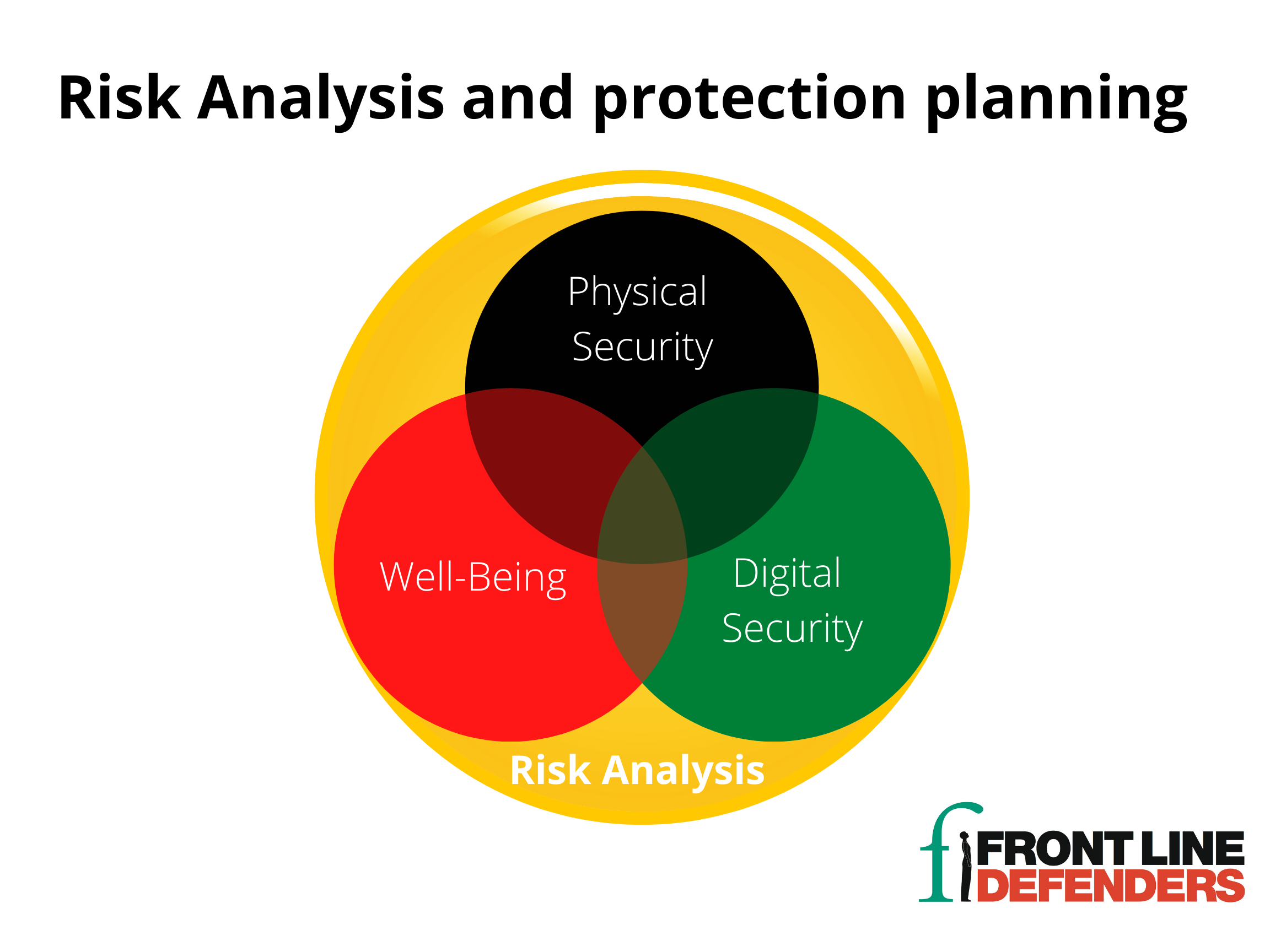|
OBJECTIVE |
To explain the rationale of the programme and give participants key information about how Front Line Defenders can help HRDs |
|
TIMING |
30 minutes |
When planning and facilitating this session, it is important to consistently apply an intersectional lens to each participant's identity and experiences, and their protection needs. Overlapping systems of discrimination and privilege, such as gender, sexual orientation, religion, disability, racial and/or ethnic origin, economic status/class, marital status, citizenship, age and physical appearance, can have a profound impact on human rights defenders' and their communities' perception of and experience with risks and protection.
Programme: the trainer explains the rational and progression of sessions
For example: Sample Programme
- review objectives briefly
- the workshop is holistic in nature and our strategic overview of risk analysis will cover physical, digital and psychosocial aspects as each intersect with each other
- after getting to know each other, we check if we are facing common risks and threats and try out a simple tool for assessing risk
- we will then look at threats, including digital threats, and consider mitigation measures
- we will bring these strands together to help you develop your own protection plan, and consider an organisation protection plan
- well-being will be woven through the workshop

How Front Line Defenders can help HRDs
For workshops conducted by Front Line Defenders staff, or consultant trainers, or supported with Front Line Defenders advice, materials and funding, it is essential to ensure that participants are aware the organisation’s programmes.
Show the Front Line Defenders website to show how the cases of HRDs from the relevant country feature, and where to find the Security Workbook and Security-in-a-Box
1. Advocacy for HRDS at risk
Front Line Defenders
- advocates on behalf of individual HRDs through Urgent Appeals for HRDs with individual governments, regional intergovernmental bodies and international intergovernmental institutions (show the front page of the website here in the relevant language version: https://www.frontlinedefenders.org/)
- meets with relevant government ministries and diplomatic representatives
- conducts advocacy for HRDs individually and collectively in the European Union from its EU Office in Brussels
2. Grants for HRDs at risk to help their protection
Protection Grants can pay for provisions to improve the security and protection of human rights defenders and their organisations including, but not limited to:
- improving physical security of an organisation or individual, digital security and communication security;
- supporting legal fees for HRDs who are being judicially harassed;
- paying for medical fees for HRDs who have been attacked or who have suffered a medical condition as a result of their peaceful human rights activities;
- providing family assistance for imprisoned HRDs or family members who are at risk because of a HRD's activities.
Grants are for amounts up to a maximum of €7,500 (although this amount is rarely given to one HRD)
3. Risk Analysis and Protection Planning
The programme includes participatory, tailored, holistic workshops of which this is one, and also courses, seminars, consultations and creating capacity-building resources.
- it aims to facilitate knowledge, expertise and sharing of skills, to provide HRDs with additional information and tools on risk analysis, physical protection, and well-being plus basic level digital protection
- a team of field-based staff is being developed and are currently available for the Americas, Europe & Central Asia, and the Middle East & North Africa as of 2021.
4. Digital Protection
- Practical, hands-on workshops and long-term assistance aimed at HRDs implementing more secure practices and tools are delivered by field based digital protection coordinators.
- working directly in a one-on-one manner with human rights organisations and individual HRDs.
- assess needs and identify digital risks, help design tailored digital security policies and cooperate in implementing and integrating the practices into daily work and life.
5. Visibility and promoting communication between HRDs all over the world
- Visibility for Protection (VfP) workshops with HRDs facing defamation and stigmatisation
- Front Line Defenders Award (annual, one per region from 2021)
- Dublin Platform (every 2 years – 100+ different HRDs invited each time)
- Annual Global Analysis – a look at trends, key issues and important developments related to human rights defenders work and security around the world
6. Other programmes
- HRD Memorial - a joint initiative by a network of national and international human rights organisations who are committed to working together to gather and verify information on the killing of HRDs whose deaths are perceived to be connected to their human rights activities.
(There are two other programmes of interest to HRDs, the ID Card and the Rest and Respite programme, however these are offered on an invitation only basis by a Front Line Defenders staff member.)
Finally, a reminder that Front Line Defenders programmes reflect what HRDs ask for, and the organisation welcomes any suggestions for protection support.
Any questions?
What can go wrong and ways do deal with this:
- participants ask about the case of a specific HRD and why Front Line Defenders has not “taken the case up”
- check if the HRD requested action from Front Line Defenders. Refer the details of the HRD to your Front Line Defenders contact for response (which may not be immediate due to the need to verify information) - participants have a lot of questions you cannot answer about Front Line Defenders
- check with your Front Line Defenders contact to see if they can join the workshop for a Q&A session, or send the questions and ask them to send you a written response, or a video response
